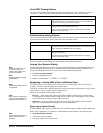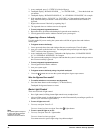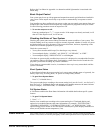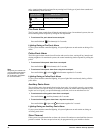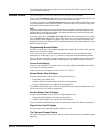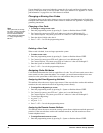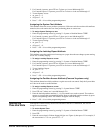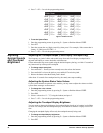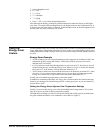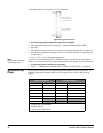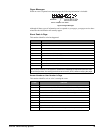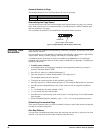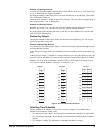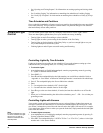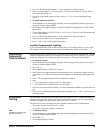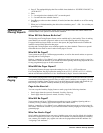
Concord 4 Series Security Systems 17
3. Select a brightness level:
0 + # Off
1 + # Low
2 + # Medium
3 + # High
4. Press
* + 00 + # to exit the programming menus.
After dimming the display, pressing any button momentarily returns the display to full bright-
ness. After 15 seconds without touchpad activity, the display returns to the set dimmed level. If
an alarm occurs while the display is dimmed, it automatically returns to the full brightness level
and stays that way until you disarm your system.
Using the
Energy Saver
Feature
Use the optional Energy Saver feature to keep the premises within a user-designated temperature
range. High and low temperature points that you set override your normal heating and air condi-
tioning temperature settings. Doing so allows you to use more energy-efficient settings when you
are away.
Energy Saver Example
• At your touchpad, you set a high temperature point (to trigger the air conditioner) and a low
temperature point (to trigger the furnace). This needs to be done only once, but can be
changed easily if necessary.
• Let’s say that you usually keep the temperature in your home at 68° F, but since no one will
be there during the day, you turn the Energy Saver feature on. If you’ve set the low tempera-
ture point to 55° F, the furnace will keep the house heated to 55° F.
• You’re about to return home and would like the house to be heated to its normal 68° F when
you arrive. If your system includes remote access, you can simply call home and turn the
Energy Saver feature off, giving control back to the furnace thermostat (68° F).
Control your air conditioning temperatures in the same manner.
In addition to controlling temperature, the Energy Saver feature notifies the central monitoring
station if your heating or air conditioning unit fails—before pipes freeze or pets are harmed by
extreme heat or cold.
Setting the Energy Saver High and Low Temperature Settings
Initially, you must set the energy saver to the desired high and low temperatures. This is done
only once, unless you want to change temperature settings.
The high and low settings you enter do not control heating and cooling systems, but determine
the point at which the furnace or air conditioner is activated (see Figure 5).



